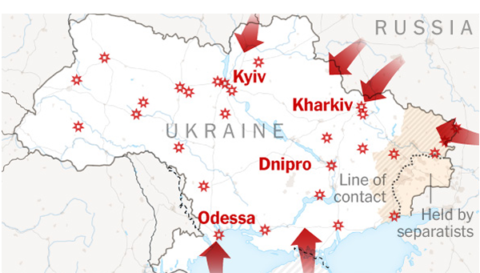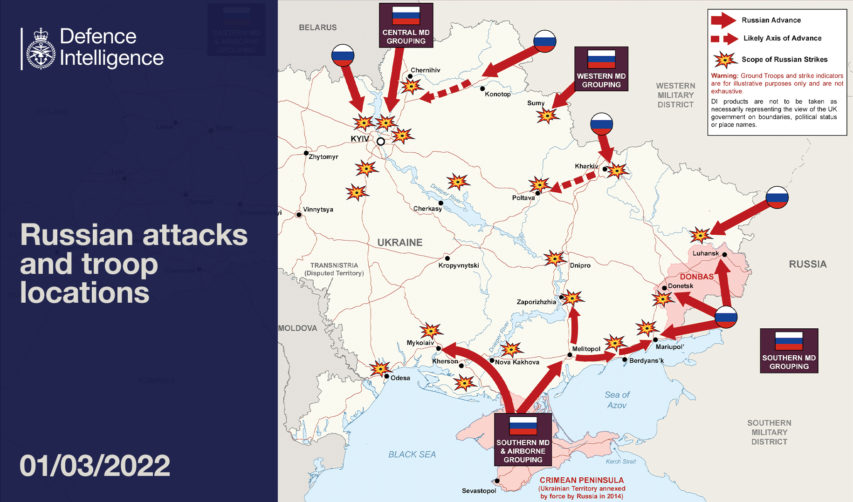World War Two
Published 1 Mar 2022This war has seen a huge amount of scientific and technological innovation. New ways of taking lives, and new ways of saving lives abound. But what about the more ordinary, everyday, products of the war? Would you be surprised to hear that people in the 21st century will still be using WWII inventions in daily life.
(more…)
March 2, 2022
Duck Tape – WW2 Secret Weapon – WW2 Special
“Somehow, the Ukrainians proceeded to launch the greatest PR operation of our times”
In The Critic, Ben Sixsmith on the plight of Ukraine under Russian attack and the rather surprising success they have been having on western social media and in legacy media coverage:
Soon after the Russians invaded Ukraine, President Zelensky released a video to the world. Filmed on his mobile phone, it looked as if he could have been anyone else in the 21st century. He was tired and sad, and the skin was red around his eyes. Whatever a strong leader looks like, President Zelensky looked like the opposite.
That feels like a long time ago now. Somehow, the Ukrainians proceeded to launch the greatest PR operation of our times. How many people had heard of Zelensky, a veteran comic actor whose most significant action on the world stage since his electoral triumph in 2019 had been listening to Donald Trump’s ramblings, until a few days ago? How many people even knew there had been fighting in Donbass?
You have to wonder if the Russians, having seen the capitulation of the Afghan government, thought a Western ally would hightail it at the first opportunity. Zelensky, on the other hand, announced that he was staying in Kiev. His speech, addressed to the Russian people, was measured, dignified and eloquent. His little updates from the Kiev streets were mischievous and bold.
A weak country invaded by a powerful aggressor is naturally sympathetic. But the Ukrainian cause projected a uniquely irresistible combination of victimhood and strength. Theirs is not a tale of mere persecution but of underdog resolve.
What happened on Snake Island, for example, remains mysterious. The Ukrainians reported that their soldiers were killed after delivering a “go fuck yourself” to a Russian warship. The Russians claim they are alive. Still, the emerging image of unbreakable defiance, spreading across the vortex of social media, has won hearts and minds across the world.
What has been crucial is that people are not just pitying. They are inspired. We have heard relatively few tales of atrocities, because the Russians were attempting to minimise casualties, but also because the Ukrainians have attempted to maximise their triumphs. Did the “Ghost of Kiev” exist? Almost certainly not. But when such urban legends were combined with undeniably tough Ukrainian resistance in cities like Kharkiv, foreign sympathisers were encouraged to think that the Ukrainians, while embattled, had a fighting chance. This has been translated into sanctions on Russia and massive donations of arms and equipment.
David Warren reports that the Chinese government has accused the Ukrainians of trouble-making in Hong Kong:
This did not happen yesterday, I should explain, but some months ago. How did those clever Ukrainians do this, my reader may ask, naïvely. They did it by secular inspiration, when they uttered the phrase, “Slava Ukraini!” — which they had been doing in their own nationalist cause since the nineteenth century — and more aggressively since they fought for independence from the Leninist regime of the Soviet Union, during 1917–21.
Since 2014, the phrase has been in the air again, just as truck horns are in the air here in the Canadas. The Hong Kongois, who tend to be well-informed to a fault, picked up on it in 2019. They began to declare, “Glory to Hong Kong!” in multiple languages, from Cantonese to English; or rather, to sing it, for this phrase and its variants are often set to music, in both countries. (The Canadian trucker’s “Honk Honk” makes its own music.)
Wi Jinping, Vladimir Putin, and little Justin Trudeau, all get quite offended by the use of such phrases; and all have gone to the trouble of manufacturing bare-faced lies to resist the respective sovereignty movements. Readers will gather that I am unsympathetic with any of these dictators, or Mr Would-Be.
Because I (or more exactly, my father) was also unfavourably inclined to the dictatorship of Mr Adolf Hitler, it may be incumbent upon me to specify of what my disapproval consists. For granted, Hitler was a nationalist of a sort. I have long been an enemy of nationalism, when it is rudely proclaimed, though with mysterious moments of enthusiasm for nationalisms of other sorts.
The Passenger Train, 1954
travelfilmarchive
Published 12 Nov 2008An educational film about train travel in the 1950s. To purchase a clean DVD or digital download of this film for personal home use or educational use contact us at questions@archivefarms.com. To license footage from this film for commercial use visit: www.travelfilmarchive.com
QotD: George Orwell was a dedicated socialist
I began this book to the tune of German bombs, and I begin this second chapter in the added racket of the barrage. The yellow gun-flashes are lighting the sky, the splinters are rattling on the house-tops, and London Bridge is falling down, falling down, falling down. Anyone able to read a map knows that we are in deadly danger. I do not mean that we are beaten or need be beaten. Almost certainly the outcome depends on our own will. But at this moment we are in the soup, full fathom five, and we have been brought there by follies which we are still committing and which will drown us altogether if we do not mend our ways quickly.
What this war has demonstrated is that private capitalism – that is, an economic system in which land, factories, mines and transport are owned privately and operated solely for profit – does not work. It cannot deliver the goods. This fact had been known to millions of people for years past, but nothing ever came of it, because there was no real urge from below to alter the system, and those at the top had trained themselves to be impenetrably stupid on just this point. Argument and propaganda got one nowhere. The lords of property simply sat on their bottoms and proclaimed that all was for the best. Hitler’s conquest of Europe, however, was a physical debunking of capitalism. War, for all its evil, is at any rate an unanswerable test of strength, like a try-your-grip machine. Great strength returns the penny, and there is no way of faking the result.
When the nautical screw was first invented, there was a controversy that lasted for years as to whether screw-steamers or paddle-steamers were better. The paddle-steamers, like all obsolete things, had their champions, who supported them by ingenious arguments. Finally, however, a distinguished admiral tied a screw-steamer and a paddle-steamer of equal horsepower stern to stern and set their engines running. That settled the question once and for all. And it was something similar that happened on the fields of Norway and of Flanders. Once and for all it was proved that a planned economy is stronger than a planless one.
George Orwell, “The Lion And The Unicorn: Socialism and the English Genius”, 1941-02-19.






